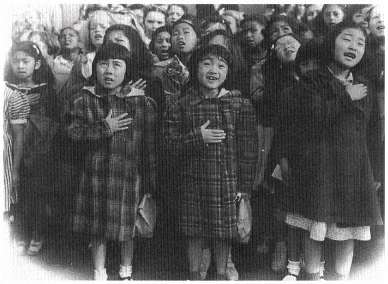 Today, February 19, marks the 71st anniversary of the signing of Executive Order 9066, which is responsible for sending approximately 120,000 Japaneses Americans to remote camps throughout the United States — two-thirds of whom were American citizens.
Today, February 19, marks the 71st anniversary of the signing of Executive Order 9066, which is responsible for sending approximately 120,000 Japaneses Americans to remote camps throughout the United States — two-thirds of whom were American citizens.
To commemorate this infamous event, I wanted to post the text from the actual executive order for people to read and reflect:
Executive Order No. 9066
The President
Executive Order
Authorizing the Secretary of War to Prescribe Military Areas
Whereas the successful prosecution of the war requires every possible protection against espionage and against sabotage to national-defense material, national-defense premises, and national-defense utilities as defined in Section 4, Act of April 20, 1918, 40 Stat. 533, as amended by the Act of November 30, 1940, 54 Stat. 1220, and the Act of August 21, 1941, 55 Stat. 655 (U.S.C., Title 50, Sec. 104);
Now, therefore, by virtue of the authority vested in me as President of the United States, and Commander in Chief of the Army and Navy, I hereby authorize and direct the Secretary of War, and the Military Commanders whom he may from time to time designate, whenever he or any designated Commander deems such action necessary or desirable, to prescribe military areas in such places and of such extent as he or the appropriate Military Commander may determine, from which any or all persons may be excluded, and with respect to which, the right of any person to enter, remain in, or leave shall be subject to whatever restrictions the Secretary of War or the appropriate Military Commander may impose in his discretion. The Secretary of War is hereby authorized to provide for residents of any such area who are excluded therefrom, such transportation, food, shelter, and other accommodations as may be necessary, in the judgment of the Secretary of War or the said Military Commander, and until other arrangements are made, to accomplish the purpose of this order. The designation of military areas in any region or locality shall supersede designations of prohibited and restricted areas by the Attorney General under the Proclamations of December 7 and 8, 1941, and shall supersede the responsibility and authority of the Attorney General under the said Proclamations in respect of such prohibited and restricted areas.
I hereby further authorize and direct the Secretary of War and the said Military Commanders to take such other steps as he or the appropriate Military Commander may deem advisable to enforce compliance with the restrictions applicable to each Military area hereinabove authorized to be designated, including the use of Federal troops and other Federal Agencies, with authority to accept assistance of state and local agencies.
I hereby further authorize and direct all Executive Departments, independent establishments and other Federal Agencies, to assist the Secretary of War or the said Military Commanders in carrying out this Executive Order, including the furnishing of medical aid, hospitalization, food, clothing, transportation, use of land, shelter, and other supplies, equipment, utilities, facilities, and services.
This order shall not be construed as modifying or limiting in any way the authority heretofore granted under Executive Order No. 8972, dated December 12, 1941, nor shall it be construed as limiting or modifying the duty and responsibility of the Federal Bureau of Investigation, with respect to the investigation of alleged acts of sabotage or the duty and responsibility of the Attorney General and the Department of Justice under the Proclamations of December 7 and 8, 1941, prescribing regulations for the conduct and control of alien enemies, except as such duty and responsibility is superseded by the designation of military areas hereunder.
Franklin D. Roosevelt
The White House,
February 19, 1942.
What’s interesting to me is that the word “Japanese” does not appear anywhere in the executive order — however, everyone reading this would have known that this was meant for Japanese/Japanese Americans living along the West Coast of the United States. Also, reading this order again gives me chills because I could see this order (or rather an order like it) being issued again in times of war or after a series of national attacks on our soil. That’s why it is important every year on February 19 to remember Executive Order 9066 to prevent it from happening again to anyone.
Image courtesy of Taylor, Sandra C. Jewel of the Desert: Japanese American Internment at Topaz. Berkeley: University of California Press, c1993 1993. http://ark.cdlib.org/ark:/13030/ft5q2nb3t5/
Transcription of Executive Order 9066 is from storymatters.gmu.edu







